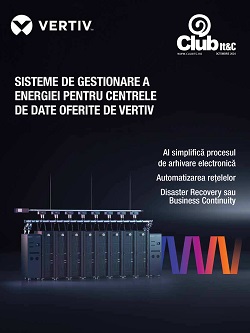 A new report, Digitalisation: An opportunity for Europe, shows how increased digitalisation of Europe’s services and value chains over the next six years could boost Romania’s GDP per capita by 16.48% and also increase productivity by 16.70%.
A new report, Digitalisation: An opportunity for Europe, shows how increased digitalisation of Europe’s services and value chains over the next six years could boost Romania’s GDP per capita by 16.48% and also increase productivity by 16.70%.
The report, commissioned by Vodafone and conducted by Deloitte, looks at the five key measures – connectivity, human capital, use of internet services, integration of digital technology and digital public services – that are measured by the European Commission’s Digital Economy and Society Index (DESI), and reveals that even modest improvements can have a big impact.
Using data from all 27 EU countries and the United Kingdom across 2014-2019, the report reveals that a 10% increase in the overall DESI score for a Member State is associated with a 0.65% higher GDP per capita, assuming other key factors remain constant, such as labour, capital, government consumption and investment in the economy.
For Romania, increasing our 2019 score by just 5 points, from 36.5 to 41.5 would boost GDP per capita by 0.89% and productivity in the long term by 4.30%. However, if the digital allocation from the EU recovery package, particularly the Recovery and Resilience Facility (RRF), was concentrated in areas that would allow Romania to aim towards a DESI score of 90 by 2027 (the end of the EU’s budget cycle), GDP could increase by as much 16.48%. If every Member State reached the 90 milestone, the report notes that “GDP per capita across the EU would be 7.2% higher at the end of the period, with countries at lower GDP per capita in 2019 standing to be the biggest beneficiaries”.
 “This report adds to the significant body of research demonstrating the positive economic and social impact of increased digitalization. For a country like Romania, with one of the lowest GDP per capita in Europe, the accelerated digitalization in key areas, including through the efficient use of allocated EU funds in the national recovery plan, is proven not only to help address the economic and societal challenges we are currently facing, but also to drive significant economic progress, with a 16.48% increase in GDP in the next 6 years. This finding places Romania as the second biggest beneficiary among select EU countries, which is a fantastic opportunity that we simply cannot miss. The EU recovery funds will prove crucial in driving this forward. The DESI index is a simple and efficient tool for Romania and all the other EU countries to measure evolution on their journey towards digitalization. A DESI score of 90 out of 100 for Romania is definitely a huge challenge, but I strongly believe that through a close collaboration between the public and private sector, we can reach this goal and make the potential benefits of digitalisation a reality”, said Murielle Lorilloux, CEO Vodafone Romania.
“This report adds to the significant body of research demonstrating the positive economic and social impact of increased digitalization. For a country like Romania, with one of the lowest GDP per capita in Europe, the accelerated digitalization in key areas, including through the efficient use of allocated EU funds in the national recovery plan, is proven not only to help address the economic and societal challenges we are currently facing, but also to drive significant economic progress, with a 16.48% increase in GDP in the next 6 years. This finding places Romania as the second biggest beneficiary among select EU countries, which is a fantastic opportunity that we simply cannot miss. The EU recovery funds will prove crucial in driving this forward. The DESI index is a simple and efficient tool for Romania and all the other EU countries to measure evolution on their journey towards digitalization. A DESI score of 90 out of 100 for Romania is definitely a huge challenge, but I strongly believe that through a close collaboration between the public and private sector, we can reach this goal and make the potential benefits of digitalisation a reality”, said Murielle Lorilloux, CEO Vodafone Romania.
Digitalisation can enable economic and societal resilience not only when it comes to connectivity and new technologies, but also by driving the digital skills of citizens and the performance of public services. Previous studies have already established broadly positive links between digitalisation and economic indicators.
This new report goes one step further, and builds on an earlier Vodafone report, also produced by Deloitte, that also looks at the wider benefits of digitalisation, which include:
• Economic: an increase in GDP per capita between 0.6% and 18.7%, depending on the country; with the EU seeing an overall increase in GDP per capita of 7.2% by 2027 – equivalent to a €1 trillion increase in overall GDP;
• Environmental: the more we use digital technologies, the greater the environmental benefits, from the reduction in paper use to more efficient cities and less use of fossil fuels – for example, using Vodafone’s Internet of Things (IoT) technology in vehicles can cut fuel consumption by 30%, saving an estimated 4.8million tonnes of CO2e last year;
• Quality of life: innovations in eHealth can improve our personal wellbeing and smart city technologies support our health with lower emissions and mortality – rolling out eHealth solutions across the EU could prevent as many as 165,000 deaths a year;
• Inclusivity: the digital ecosystem opens up opportunities to more members of society. As we invest in digital skills and tools, we can share the benefits of digitalisation more equitably – for example, for every 1,000 new broadband users in rural areas, 80 new jobs are created.
In addition to commissioning this report, Vodafone has a number of initiatives, at both EU and member state levels, that will support the drive towards digitalisation and the push for 90 for 27. Visit www.vodafone.com/EuropeConnected for more details.






























